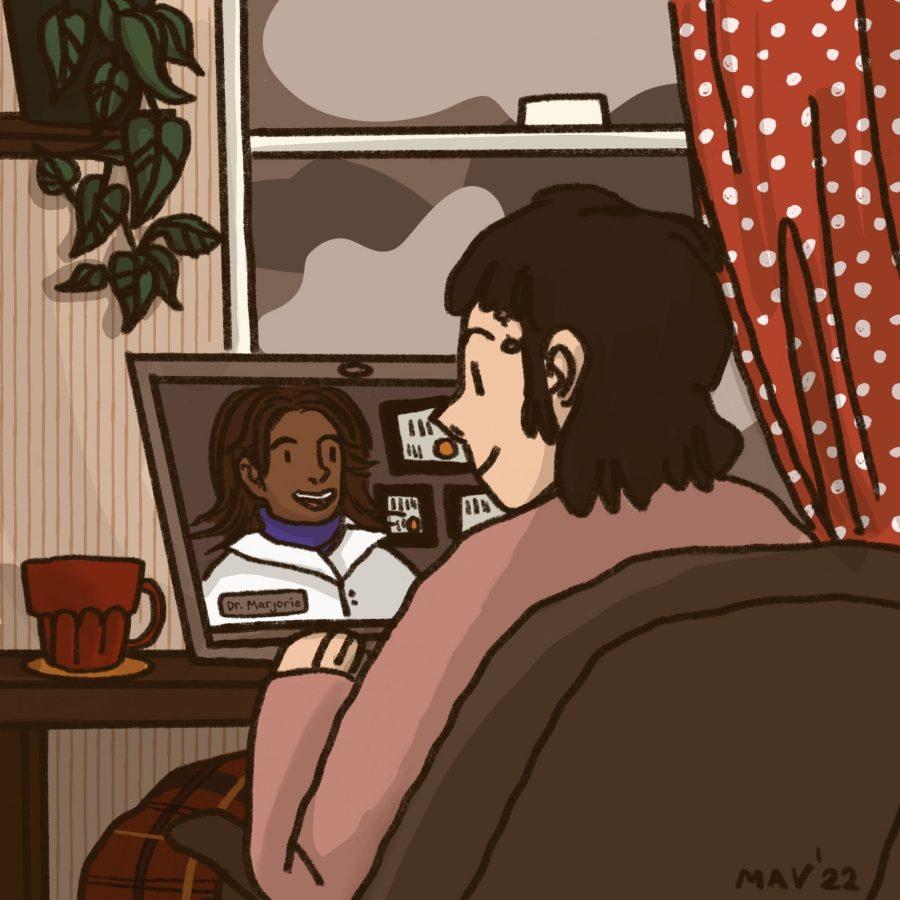OPINION: Togetherall is the online mental health resource everyone should be using
An image of a person talking with an online mental health provider by Mary Ann Vagnerova
November 15, 2022
The online community that supports students’ mental health is larger than you may think. Counselors and clinicians at the University of Arizona are committed to bringing this community to the student body on campus. Life has increasingly moved online post-pandemic, and this move has generated virtual means to effectively address mental health, changing the landscape of health support for the benefit of students.
Student services have expanded to include Togetherall, a newly adopted resource within UA Campus Health’s Counseling & Psych Services. Togetherall has recently emerged as an innovator and leader for improving mental health, and they’re doing it remotely. It provides a safe, anonymous space to connect and converse with others who seek similar support, a sense of community and improvement of their mental health. Monitored by licensed clinicians who provide instantaneous responses with full-time access, the platform has been a reference point for many health representatives at the University of Arizona for its reputation of effectiveness.
The Assistant Director of Counseling & Psych Services at Campus Health, Debra Cox-Howard, was instrumental in bringing the online community, Togetherall, to campus. While Togetherall is not directly affiliated with the UA, the efforts of Cox-Howard and others have advocated for its expansion onto campus. Its recent addition as a mental health resource will help educate faculty and diversify its portfolio on treatment options when it comes to properly assisting students.
Among the many online services offered by CAPS, Cox-Howard emphasized the importance of Togetherall. When asked about the program she said, “they do a very good job of linking back to our website where you can find self-help information and other resources that are available to you as a student on this campus.” Togetherall aligns with the student-driven approach that CAPS takes to ensure a healthy academic experience. Their approach to online services creates convenience and time efficiency for students, as the choice to support a fully online platform was intentional and due to the impact of the pandemic on student life.
Many students continue to learn remotely, and health professionals like Cox-Howard strive to meet students where they are. Students have given feedback that Togetherall helped them feel less isolated in the midst of the pandemic. This was one piece of technology that gained popularity from the pandemic, and it certainly validated the idea that there is an excessive amount of time and cost associated with commuting to a meeting that could just as effectively be held online. Togetherall appeals to students as it is easily accessible, always available and free to join.
“2.5 million students [are] able to access the platform, and CAPS gets thousands of new students that are joining every month,” Cox-Howard said.
The sudden influx of students joining the online mental health community is likely due to the comfort in online anonymity and the ability to share sensitive information freely without worrying about personal identification or association. According to Cox-Howard, a striking “64% of students are sharing thoughts or feelings [on Togetherall] because it’s anonymous.”
Anonymity is simply more time efficient for students because it focuses on only providing the important information and avoiding any introductions or social interactions present in-person that may otherwise inflict on students’ treatment processes. Pros and cons exist for both online and in-person treatment, and Cox-Howard believes that online treatment has strengthened enough to become as effective as the human presence of a therapist or community group because, “it’s going to depend upon the person and their needs” and “we as clinicians have become more savvy as to how we can still interact with students.”
As a senior student, I have experienced the UA before and after the pandemic, which brought significant online mental health opportunities to campus. In my experience, health professionals have built the skill set to sufficiently treat patients and handle their needs virtually. While I personally believe that using Togetherall will efficiently address your critical needs as a person to help you perform at your best as a student, UA Clinical Assistant Professor at the UA College of Medicine and Director of the Addiction Medicine Fellowship, Dr. Elisa Gumm, shared another perspective on her experience expanding the online mental health community.
The Addiction Medicine Fellowship, composed of student medical fellows, focuses on improving treatment of individual substance abuse in the greater Tucson community; the fellowship offers a whole host of online services such as telehealth appointments. The addiction community came together to support their own during COVID-19. While Dr. Gumm was not aware of the platform Togetherall, she emphasized the easy accessibility of similar organizations that have built supportive online communities. Alcoholics Anonymous, SMART Recovery and an organization unique to Tucson, Buddhist Recovery Network, all offer peer-supported online modalities and recovery models for both mental health and addiction issues. From our conversation, it’s clear that many mental health professionals believe that utilizing Togetherall and mental health resources alike should be an essential part of the student experience.
The first step to addressing your mental health is having a conversation with a professional support structure, and the College of Medicine has made significant efforts to bring that accessibility online for their patients. Gumm said, “We have to stop thinking that everybody fits in this same box and that everyone is going to benefit from face-to-face or virtual.” Togetherall is available to everyone with access to the internet, no matter your schedule or situation. The space has a place for many struggles, needs and treatments.
Life moved online may have increased the struggle to control mental health among college students. Since the beginning of the pandemic, social isolation has likely been one of the leading factors that have affected mental health. Fortunately, technology has allowed for many aspects of life to continue and for many people to get the mental health support they need. A Zoom classroom alone can reveal how technology has transformed and improved our society to provide more efficient solutions to our most basic needs.
Technology creates convenience and opportunities to address new challenges and it can help you focus on your mental health. CAPS illustrates that Togetherall is a great solution for students searching for comfortable and cost-efficient mental health relief. I urge others to explore Togetherall to address concerns and establish connections. Conducting self-care is not selfish and protecting your well-being should be prioritized by every student, even before that overdue homework assignment.
Follow the Daily Wildcat on Twitter

Luke Hamlin is a senior at the University of Arizona. He enjoys spending time with friends and family, being active outdoors and thrifting for clothes and can be found cheering for the Minnesota Vikings on football Sundays.



